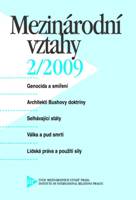Architekti Bushovy doktríny: Vliv neokonzervativců na vytváření zahraničněpolitické strategie George W. Bushe
The Influence of Neoconservative Concepts on the Foreign Policy Strategy of George W. Bush
Author(s): Lukáš HoderSubject(s): Politics / Political Sciences
Published by: Ústav mezinárodních vztahů
Keywords: neoconservatives; George W. Bush; US foreign policy strategy; decision-making process; centralisation of executive power; Advisory Systems Decision Framework; 9/11
Summary/Abstract: The paper analyzes the influence of neoconservative concepts of the 1990’s on the foreign policy strategy of the George W. Bush administration after 9/11. The text begins with a short presentation of the neoconservative movement, particularly its second generation. The paper then compares neoconservative concepts from the 1990’s with principal documents of the Bush administration and shows their influence. The next part of the text presents the factors able to explain this influence. These factors are the specific long-term evolution of central institutions in the USA, the special decision-making process of the administration, the managerial style of president Bush and also the impact of the 9/11 terrorist attacks.
Journal: Mezinárodní vztahy
- Issue Year: 44/2009
- Issue No: 2
- Page Range: 25-43
- Page Count: 19
- Language: Czech

